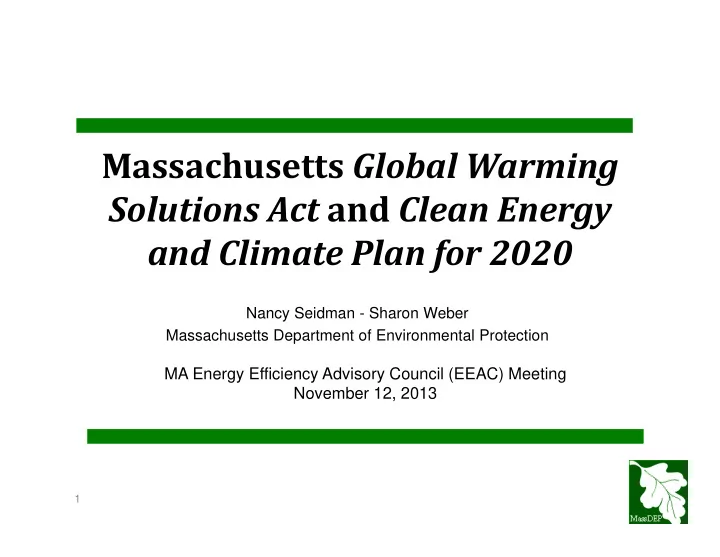

Massachusetts Global Warming Solutions Act and Clean Energy and Climate Plan for 2020 Nancy Seidman - Sharon Weber Massachusetts Department of Environmental Protection MA Energy Efficiency Advisory Council (EEAC) Meeting November 12, 2013 1
Global Warming Solutions Act (GWSA) Requirements • Collaborate across agencies to reduce greenhouse gas (GHG) emissions to the limits established in the law • Adopt a statewide GHG emission reduction limit of 10-25% below 1990 baseline level by 2020 and at least 80% by 2050 • Create economy-wide Clean Energy and Climate Plan for 2020 no later than Jan 1, 2011 to reduce GHG emissions • Establish GHG emissions registry and reporting system • Publish an inventory with estimates of GHG emissions no later than Dec 31, 2010 and every 3 years thereafter • Publish 5-year report on GWSA implementation no later than Jan 1, 2014 • Update Clean Energy and Climate Plan for 2020 by Jan 1, 2016 2
Massachusetts Clean Energy and Climate Plan for 2020 (CECP) • In December 2010, the Massachusetts Executive Office of Energy and Environmental Affairs: – Set the 2020 emissions reduction requirement at 25% below 1990 levels; maximum amount authorized by law – Issued the CECP that lays out 28 programs and policies to reduce GHG emissions from 4 sectors to achieve 25% reduction goal by 2020 3
CECP Approach 4
Massachusetts GHG Emissions 5
Massachusetts EE Policy Drivers • Massachusetts Global Warming Solutions Act (2008) requires greenhouse gas (GHG) reductions of 25% by 2020 and 80% by 2050 (compared to 1990 baseline) • Green Communities Act (2008) requires “acquisition of all available energy efficiency and demand reduction resources that are cost effective or less expensive than supply” and uses RGGI auction proceeds for EE • Massachusetts Clean Energy and Climate Plan for 2020 relies on EE for largest segment of reductions (nearly one third of 25% reduction) 6
7
Annual vs. Lifetime vs. Cumulative Annual EE Savings 8
CECP Energy Savings as % of Forecasted Retail Sales Annual Growth Rate electric gas oil 2010 1.3% 0.6% 2010 ‐ 2012 TYP 2011 1.9% 0.9% 2012 2.2% 1.15% 2013 2.4% 1.3% 5% 2014 2.5% 1.45% 5% 2015 2.6% 1.6% 5% 2016 2.7% 1.75% 5% 2017 2.8% 1.9% 5% 2018 2.9% 1.9% 5% 2019 2.9% 1.9% 5% 2020 2.9% 1.9% 5% 9
Next Steps • Estimate EE GHG benefits for tracking purposes in: – GWSA-required 5-Year Report – forthcoming GWSA Dashboard 10
Questions/Comments? Thank you! 11
12
13
CECP Emission Factors • 1030 pounds carbon dioxide per megawatt hour (lb CO 2 /MWh) saved • 0.00585 short ton CO 2 /therm gas saved • 161.386 lb CO 2 /million British Thermal units (mmBtu) oil saved • 139.178 lb CO 2 /mmBtu propane saved 14
Recommend
More recommend